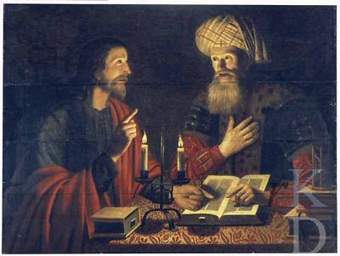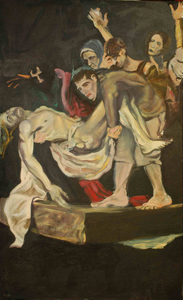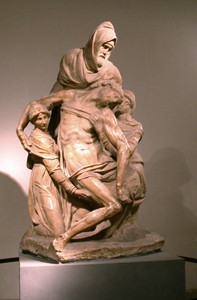Repenting of My Righteousness:
A Jewish Ritual for a Lenten Discipline
For Sunday March 16, 2014
The Second Sunday in Lent
Lectionary Readings (Revised Common Lectionary, Year A)
Genesis 12:1–4a
Genesis 12:1-4
1 The Lord had said to Abram, “Go from your country, your people and your father’s household to the land I will show you.
2 “I will make you into a great nation, and I will bless you; I will make your name great, and you will be a blessing.
3 I will bless those who bless you, and whoever curses you I will curse; and all peoples on earth will be blessed through you.”
4 So Abram went, as the Lord had told him; and Lot went with him. Abram was seventy-five years old when he set out from Harran.
Psalm 121
Psalm 121
1 I lift up my eyes to the mountains—
where does my help come from?
2 My help comes from the Lord,
the Maker of heaven and earth.
3 He will not let your foot slip—
he who watches over you will not slumber;
4 indeed, he who watches over Israel|
will neither slumber nor sleep.
5 The Lord watches over you—
the Lord is your shade at your right hand;
6 the sun will not harm you by day,
nor the moon by night.
7 The Lord will keep you from all harm—
he will watch over your life;
8 the Lord will watch over your coming and going
both now and forevermore.
Romans 4:1–5, 13–17
Romans 4:1-5, 13-17
1 What then shall we say that Abraham, our forefather according to the flesh, discovered in this matter?
2 If, in fact, Abraham was justified by works, he had something to boast about—but not before God.
3 What does Scripture say? “Abraham believed God, and it was credited to him as righteousness.”
4 Now to the one who works, wages are not credited as a gift but as an obligation.
5 However, to the one who does not work but trusts God who justifies the ungodly, their faith is credited as righteousness.
13 It was not through the law that Abraham and his offspring received the promise that he would be heir of the world, but through the righteousness that comes by faith.
14 For if those who depend on the law are heirs, faith means nothing and the promise is worthless,
15 because the law brings wrath. And where there is no law there is no transgression.
16 Therefore, the promise comes by faith, so that it may be by grace and may be guaranteed to all Abraham’s offspring—not only to those who are of the law but also to those who have the faith of Abraham. He is the father of us all.
17 As it is written: “I have made you a father of many nations.” He is our father in the sight of God, in whom he believed—the God who gives life to the dead and calls into being things that were not.
John 3:1–17 or Matthew 17:1–9
John 3:1-17
1 Now there was a Pharisee, a man named Nicodemus who was a member of the Jewish ruling council.
2 He came to Jesus at night and said, “Rabbi, we know that you are a teacher who has come from God. For no one could perform the signs you are doing if God were not with him.”
3 Jesus replied, “Very truly I tell you, no one can see the kingdom of God unless they are born again.”
4 “How can someone be born when they are old?” Nicodemus asked. “Surely they cannot enter a second time into their mother’s womb to be born!”
5 Jesus answered, “Very truly I tell you, no one can enter the kingdom of God unless they are born of water and the Spirit.
6 Flesh gives birth to flesh, but the Spirit[b] gives birth to spirit.
7 You should not be surprised at my saying, ‘You must be born again.’
8 The wind blows wherever it pleases. You hear its sound, but you cannot tell where it comes from or where it is going. So it is with everyone born of the Spirit.”
9 “How can this be?” Nicodemus asked.
10 “You are Israel’s teacher,” said Jesus, “and do you not understand these things?
11 Very truly I tell you, we speak of what we know, and we testify to what we have seen, but still you people do not accept our testimony.
12 I have spoken to you of earthly things and you do not believe; how then will you believe if I speak of heavenly things?
13 No one has ever gone into heaven except the one who came from heaven—the Son of Man.
14 Just as Moses lifted up the snake in the wilderness, so the Son of Man must be lifted up,
15 that everyone who believes may have eternal life in him.”
16 For God so loved the world that he gave his one and only Son, that whoever believes in him shall not perish but have eternal life.
17 For God did not send his Son into the world to condemn the world, but to save the world through him.
In Flannery O'Connor's short story Revelation, the character Mrs. Turpin is a good, decent, upright, and proud woman who did everything right — except that she was a racist. She was blinded to this ugly reality by her self-righteousness. She was a person, writes O'Connor, who when she entered heaven needed "even her virtues burned away."
Mrs. Turpin has provoked me to try a different Lenten discipline, one with the help of a Jewish ritual — not only to repent of my unrighteous acts and attitudes, but also to repudiate my efforts at righteousness.
There's a thin line between true righteousness and self-righteousness, between sanctification that beautifies me and sanctimony that blinds me. The losing battle of self-justification is hard to quit.
Our Jewish forbears have an ancient ritual to address this problem. It's called Kol Nidre — in Aramaic, "all vows." The Kol Nidre is a declaration that is recited at the beginning of the service on the eve of Yom Kippur (Day of Atonement).
 |
Jesus and Nicodemus, Crijn Hendricksz, 1616–1645. |
The service begins with a prayer: "In the tribunal of heaven and the tribunal of earth, by the permission of God — blessed be He — and by the permission of this holy congregation, we hold it lawful to pray with the transgressors." That is, we take our place among the sinners rather than the saintly.
The cantor then chants the prayer that begins with the first two words "Kol Nidre."
"All vows, obligations, oaths, and anathemas, whether called 'ḳonam,' 'ḳonas,' or by any other name, which we may vow, or swear, or pledge, or whereby we may be bound, from this Day of Atonement until the next (whose happy coming we await), we do repent. May they be deemed absolved, forgiven, annulled, and void, and made of no effect; they shall not bind us nor have power over us. The vows shall not be reckoned vows; the obligations shall not be obligatory; nor the oaths be oaths."
The leader and the congregation respond by quoting Numbers 15:26: "And it shall be forgiven all the congregation of the children of Israel, and the stranger that sojourneth among them, seeing all the people were in ignorance."
The idea behind Kol Nidre is that however well-intended, we break our promises to God. That shouldn't surprise us. We need forgiveness for "all vows" of righteousness.
In his book In God's Shadow (2012), Michael Walzer of Princeton observes that Israel began with two different but related covenants — one with Abraham based upon kinship, family, and birthright as a chosen people, and another with Moses based upon a legal covenant, a nation, and law. In the epistle for this week, Paul repudiates both of these foundational appeals for divine favor.
Paul once boasted on both accounts. He was a "Hebrew of Hebrews" who could trace his ancestry to the tribe of Benjamin. As for the Mosaic law, he said he was "zealous" and "faultless." But Paul later repudiated these vows of righteousness: "whatever was to my profit I now consider loss."
 |
Nicodemus by Dominic Pelicano. |
Counting how many times a word occurs in the Bible can lead to dubious interpretations. But Romans 4 for this week is a glaring exception. At least 10 times Paul uses the word "credit" to describe our relationship with God. A credit is a free gift; it's the opposite of a wage that is paid for work or an obligation that is earned.
No one can curry God's favor by keeping the Mosaic law, by claiming kinship with Abraham, or by any other well-intentioned vow (including those of Lent).
But everyone can receive a free gift — even Gentiles, says Paul, who are not of Abrahamic ancestry and who are ignorant of the Mosaic law.
God's free promises come "by faith," says Paul. Faith, said Luther, is the beggar's empty hand that can do nothing except receive a gift with gratitude.
Similarly, in the gospel this week, Nicodemus is the consummate religious insider — a "member of the ruling Jewish council" and "a teacher of Israel."
But Jesus says that if he wants to "enter the kingdom of God" he must let this go and leave it behind. He must be twice-born, once by his earthly mother through water, and then again by his heavenly Father through the Spirit. Only the free gift of God's love, and no human effort, can do this.
So, thank God for the liturgical repudiation of righteousness. In his new book of poetry called Idiot Psalms (2014), Scott Cairns ponders the implications of this ancient Jewish ritual. The poem is called Kol Nidre.
Good to reconsider, and then to disavow
whatever mitigations one has let usurp,
eclipse, or glibly water down whatever good
he may have thought to offer. Some untoward something
will often sprout from any swollen hull thus sown.
The unforeseen is guaranteed to flourish well
beyond the harried terms of any vow expressed
from one's more narrow sense or solitary will.Good therefore to have another go at what
might prove of use beyond one's dim intention, no?
Good thereafter to unsay, recant what harm
has billowed, subsequent, from ill-considered
promise. Good that one prepare ever to repent.
 |
Nicodemus by Michaelangelo. |
Don't get me wrong. Lenten disciplines can serve a positive purpose, especially in our culture of indulgence and entitlement. In past years I've abstained from meat and alcohol. One Lent I ate only one meal a day. All things considered, I think I was better off for those disciplines.
I find it a lot harder, though, in our culture of merit, to repudiate my "vows" of righteousness and my many self-justifications. True repentance, says Cairns, is a two-step process.
"Repentance," says Cairns in another prose poem, "is never fit if the turn is nothing but away from one regrettable occasion on singeing grief; its purpose and sole agency depend — in thought and act and word — upon the turning to."
So, in the spirit of Kol Nidre, this Lent I'll turn away from my vows of righteousness. And I'll turn to God, who promises to "credit" me with his free gift of love.
Image credits: (1, 3) Wikipedia.org and (2) DomincPelicano,.org.





